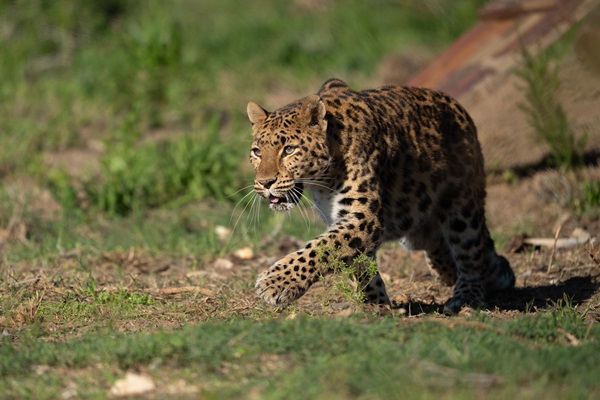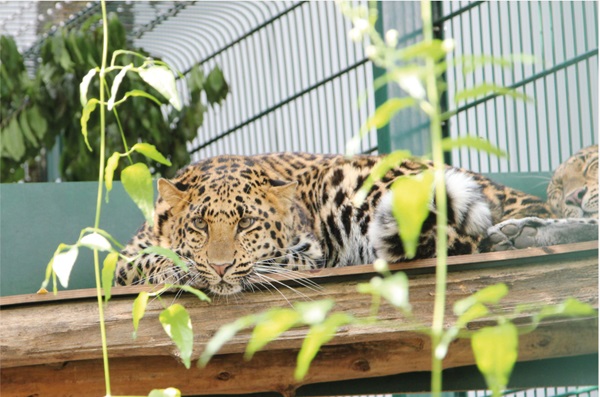 Ginny released into her new home;
Credit: Lyndon Brandt
Ginny released into her new home;
Credit: Lyndon Brandt
On International Leopard Day, 3 May, the Born Free Foundation reported that two leopards rescued from Poland have now found safety in a sanctuary in South Africa, following a 13,000-kilometre journey from Belgium via Luxembourg.
Leopard mother and daughter, Alda and Ginny, believed to be around fourteen and eight years old respectively, faced a deeply uncertain future as victims of the illegal trade in and trafficking of wild animals. Until 2017, they were being kept, along with many other animals, in inhumane conditions at an unlawful breeding facility in Śrem near Poznań, Poland. When police and authorities raided the private farm that year, they found animals crammed in dirty, inadequate conditions, some without access to the outdoors. The facility in Śrem was subsequently shut down by the Polish authorities and the leopards, along with other animals, were confiscated.
Alda and Ginny were confined to a tiny, dark, barren cell with very little outside space taken to the Natuurhulpcentrum wildlife rescue centre in Belgium. Since 2017, the dedicated staff at NHC have cared for the mother and daughter, giving them specialist care to help them recover. At the time of confiscation, the Polish authorities gave permission for the leopards to be taken to Belgium, but it has taken “several years, and many hundreds of hours of hard work”, to secure all the correct documentation and certificates, so that plans could finally be put in place for a permanent home for the leopards, the Born Free Foundation added.
The leopards’ rehoming in South Africa became a reality this week, when Alda and Ginny travelled more than 12,800 km by road and air on international and domestic flights, to reach their destination, Born Free’s Big Cat Sanctuary at Shamwari on South Africa’s Eastern Cape.
After their journey, the leopards were released on Wednesday 1 May 2024. Initially, both Alda and Ginny took tentative steps out of their crates, sniffing the South African soil beneath their paws and carefully examining their new surroundings. The animal care team at Shamwari reported they were “thrilled” to see both leopards looking relaxed and very quickly starting to explore the natural bush of their 2.5-acre enclosure, taking in the sights sounds and smells of their new “forever” home.
Within half an hour, the mother and daughter had found each other and were reunited, both looking well and enjoying the privacy of the thickets and dense bush. The Born Free team added it will now be monitoring the leopards closely and care for them.
Born Free emphasised it has four decades of experience rehoming big cats, but the task of relocating two grown leopards was nevertheless “complex and time-consuming”. The association noted it took “hundreds of hours of planning, evaluation and care” for Natuurhulpcentrum, Shamwari Private Game Reserve, Olsen Animal Trust, Cargolux and BidAir Cargo, to ensure the safety, comfort and security of Alda and Ginny throughout their journey, and beyond. The leopards travelled from Luxembourg to Johannesburg, on a specialist flight, provided free of charge by Cargolux.
Alda and Ginny’s rehoming also marks Born Free’s 40th anniversary.
Sil Janssen, Founder of Natuurhulpcentrum, said: “We rescued the leopards, a mother and her daughter from an illegal breeding centre seven years ago. The animals were confiscated because they were poorly cared for and kept in appalling conditions. The animals were kept in concrete cages that were far too small, without any distractions. We are very happy that we can work with Born Free again to give these animals a very good permanent home. We are sure that our leopards will do very well now in the care of Born Free at Shamwari.”
Catherine Gillson, Born Free Manager at the Shamwari Private Game Reserve, added: “The dramatic change that Ginny and Alda are about to experience in their lives is going to be a privilege to see. The horrendous conditions that they experienced whilst living in their birthplace of Poland in an illegal breeding centre are going to be a stark contrast to the natural thick vegetation in their enclosures surrounded by their indigenous ancestors on Shamwari Private Game Reserve. While sadly they can never fully be released to the wild, we hope they will quickly adapt to the new environment where they will have natural enrichment, be fed the correct diet and live out their lives in the respectful care of our dedicated Born Free Animal Care Team.”

Credit: © Natuurhulpcentrum








